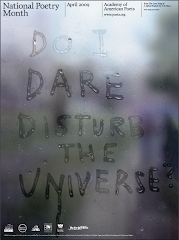I believe that Harold Bloom is at his obstinately pompous best in this essay, sometimes its difficult to make it through one paragraph just to get to his next. He speaks of literature today vs. the canonical literature of yesterday. He does mention some good points: the fact that literature has too many things to compete against in today's world, his worry about literary studies having a future, and the loss of some worthwhile texts being taught in school because of a lack of audience.
However, it is his obstinacy in maintaining that the only truly great works were written by Milton, Chaucer, Dante and yes, of course, Shakespeare. Ok, got it, they did do some great work but others that came after them have done some remarkable pieces as well. It isn't fair to discount someone's work for the singular reason that their last name isn't Dante. As for the lenses that we spoke of last class, Bloom doesn't even consider the issue worthwhile.
"The idea that you benefit the insulted and injured [race, class, gender, etc.] by reading some of their own origins rather than reading Shakespeare is one of the oddest illusions ever promoted by or in our schools." pg. 229
So, can it be one or the other? Does it have to be? By gaining pieces of modern literature are we forced to give up some of the traditional canonical works? Are we as readers ultimately gaining or losing? I don't believe its really a question in our class any longer but should works by the "insulted and injured" be included? And for what reason? Do they have something to share that the "dead white guys" didn't?
Subscribe to:
Post Comments (Atom)













I think my response to Megan covers this pretty well... I will add that I believe that the canon will always exist (maybe not that it should, but that it will... and I'm not sure how I feel about that), but I am not sure that the canon will always exist as it does now.
ReplyDeleteThe more I think about it, the more I think it is likely that the texts of "insulted and injured" groups will become part of the canon in the future precisely because of classes like ours where we question their exclusion. I think the awareness in literary studies today will result in an eventual inclusion of these works in the canon. However, since many people have just recently become aware of these works, they will have to stand the "test of time" starting now, rather than starting when they were written. This may mean that works will not become part of the canon until far after they deserve to have become a part of it... but I do think they will get there eventually, regardless of how much Harold Bloom disagrees with the idea.